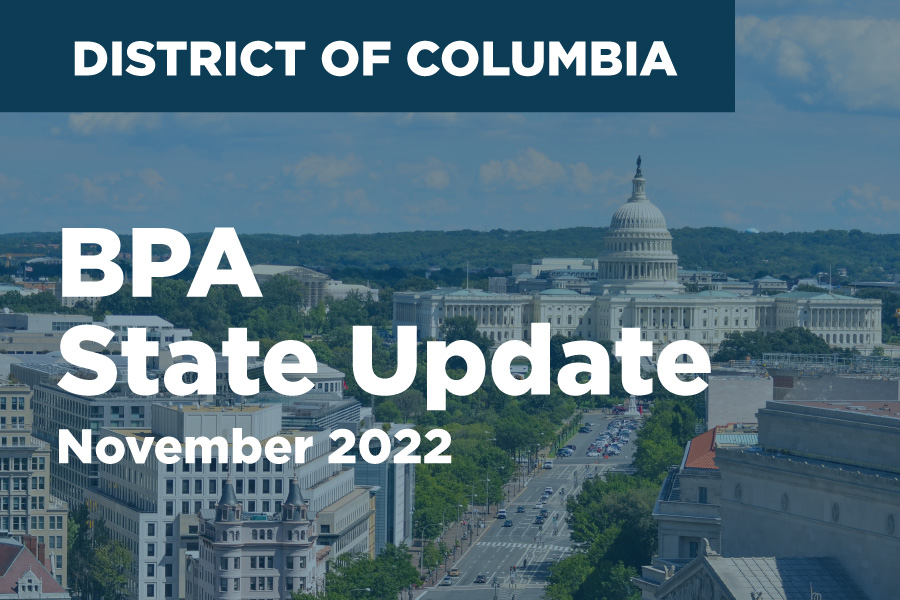
November 2022 – District of Columbia Policy Update
November 8, 2022
BPA tracks the latest policy updates and legislative issues in many states across the nation. See the latest policy information for Washington D.C. as of November 2022.
Disclaimer: Inclusion of any bills/regulations in this state policy update does not equate to BPA’s endorsement.
DC’s Fiscal Year 2023 (FY23) Budget officially took effect on October 1 with a set of provisions impacting investments in energy efficiency measures in District homes and buildings including over $40 million to replace HVAC and boiler systems in public schools and $30 million to finance energy audits and energy efficiency measures in public affordable housing. This measure takes effect alongside new laws passed in July which prohibit the use of fossil fuels for space and water heating and cooling in new commercial, large residential, and public buildings by 2027 and requires 100% carbon neutrality across DC by 2045 (full details below).
In addition, DC Public Service Commission (PSC) has approved the Energy Efficiency and Demand Response Program proposed by Pepco to implement a new set of energy efficiency programs in DC (more details below) and the DC Clean Energy Advantage Loan Program providing low-interest loans to DC residents for energy efficiency home improvements including energy audits, building envelope improvements, HVAC upgrades, and other efficient appliance replacements. Contractors may register at cealoan.org to participate in the program.
Regulatory Monitor:
- In September, the PSC extended the deadline until November 4, 2022 for the Potomac Electric Power Company (Pepco) and the Customer Impact Working Group (CIWG), composed of industry stakeholders, utilities, and public advocates, to prepare a report addressing estimated costs and outstanding issues including performance metrics used to evaluate implementation of Green Button Connect My Data (CMD) platform across existing advanced metering infrastructure in the district. Following submission of the report, PSC will open a public comment period to consider next steps for implementation of CMD.
- As part of Formal Case No. 1167, DC PSC continues to review stakeholder comments on Pepco’s Climate Action Plan, which is designed to meet clean energy goals set by the DC Clean Energy Act of 2018 of 100% carbon-free electricity by 2032, 50% energy reduction in all DC buildings by 2030, and 100% all-electric homes by 2050. Towards these goals, Pepco has proposed a suite of residential and commercial energy efficiency programs over the next 5 years that provide rebates for efficient electric appliances, HVAC systems, smart thermostats, and other emissions-reduction measures in homes. Pepco also released a long-term, 30-year plan that highlights rebates for high efficiency and electric appliances, grid-integrated thermostats, and building retrofits as a key to meeting clean energy goals through 2050. After closing a period for public comment, PSC is anticipated to make a final ruling on Pepco’s proposal to launch residential and commercial energy efficiency programs starting in 2023.
- On August 10, the DC PSC approved Pepco’s proposed Energy Efficiency and Demand Response (EEDR) Program to help reduce the amount of energy used by homes and businesses in the District. The approved EEDR Program portfolio will be funded through a monthly surcharge on utility customers’ bills and consists of nine programs, including Home Performance with ENERGY STAR, Bring Your Own Device residential demand response, My Energy Target Program using AMI data and modeling tools to provide customized savings targets, and midstream rebates for contractors and distributors. Beginning on January 1, 2023, Pepco will launch the host of newly approved EEDR Programs through the end of 2026.
- DC Department of Energy and Environment (DOEE) is requesting public comments in developing the Fiscal Year 2023 Draft State Plan for the Low- Income Home Energy Assistance Program (LIHEAP) which provides assistance to low-income households in meeting their home energy costs, including through low-cost residential weatherization and other cost-effective energy-related home repair. DOEE will also host a Public Hearing on Thursday, August 25 to discuss public input before moving forward with an FY23 LIHEAP State Plan.
Legislative Monitor:
2022 Regular Session Dates: January 3 until December 31. **Note: Legislature meets throughout the year.
Bills passed in 2022:
- Climate Commitment Act of 2021 codifies a District-wide goal to achieve carbon neutrality by 2045, adding an interim target of 60% greenhouse gas reductions by 2030. To meet these goals, the legislation would prohibit fossil fuel heating and cooling systems in new public buildings such as schools or government buildings by 2026. Introduced in May 2021, DC Council voted unanimously to approve this bill on July 12. The bill received final signature into law from Mayor Bowser on July 27.
- Clean Energy DC Building Code Amendment Act of 2021 would require all new commercial buildings constructed in DC to comply with a net zero energy code starting in 2027. To meet this requirement, the legislation prohibits the use of fossil fuels for space and water heat in new buildings greater than four stories – including for residential purposes. Introduced on October 8, the Committee on Transportation and the Environment held a vote passing the bill unanimously on June 28 and the full DC Council voted unanimously to approve this bill on July 12. The bill received final signature into law from Mayor Bowser on July 27.
- Local Budget Act of 2022 is the DC budget bill for the upcoming fiscal year, which includes $30 million for the Department of Housing and Community Development to provide financing for energy audits and energy efficiency upgrades and additional funding for the Department of Employment Services to establish a Workforce Investment Council to provide recommendations to train workers in energy efficiency trades. The budget prohibits the District government from installing gas fired space- or water-heating systems in District-owned buildings, beginning January 1, 2025. DC Council voted to approve the full FY23 budget bill on May 24, which will take effect on October 1.
